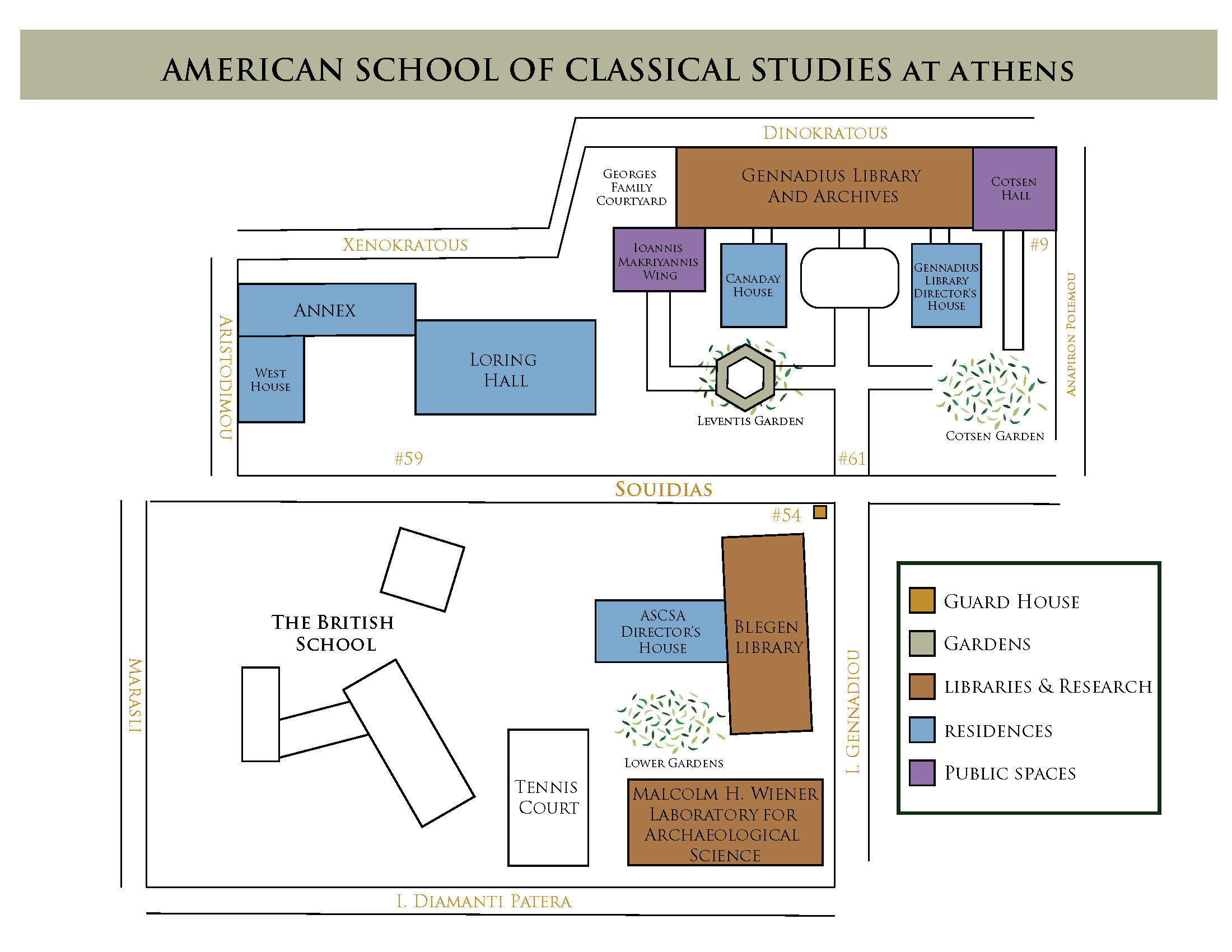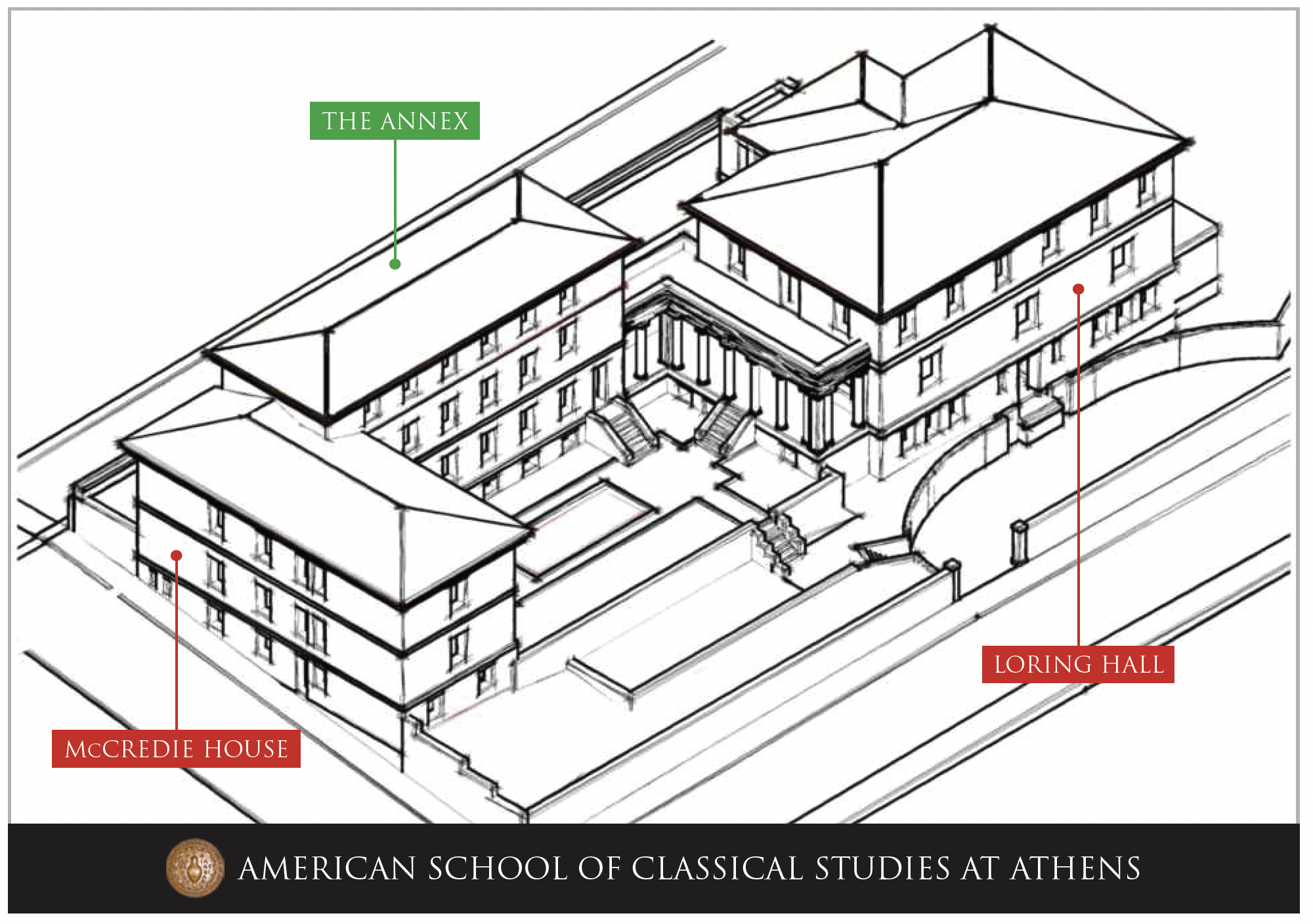Health, Safety, and Accessibility
This webpage lists safety, security, and health protocols (as necessary), as well as accessibility information.
Health Protocols
There are no COVID-related entry requirements for arrival into Greece. As of Sunday May 1, 2022 and for as long as the epidemiological data allow so, all travelers arriving in Greece, regardless of their country of origin, are no longer required to display a valid certificate of vaccination or recovery from COVID-19, or evidence of a negative test result from SARS-CoV-2 infection (PCR or Rapid Antigen test).
COVID vaccinations are no longer required, but members of the School are strongly encouraged to keep up to date with both COVID and flu vaccinations. Be sure to check before leaving for Greece that you have the current boosters. It is very difficult for non-citizens to receive vaccinations in Greece. The ASCSA requires all program participants and fellows to be fully vaccinated for Tetanus/Diphtheria (must be within 10 years). We also strongly recommend vaccinations for Meningitis, and Hepatitis A and B.
The School reserves the right to institute masking requirements as the situation warrants.
No Smoking Policy: Because of fire hazard and health risks, we require anyone who wishes to smoke to leave the confines of the American School. This restriction applies to all buildings and facilities, including all gardens.
Health Considerations (mental and physical)
The ASCSA is committed to a healthy workplace environment that encourages growth and respect for all members and employees. The School protects your right to enjoy an educational and working environment free from unlawful discrimination, harassment and retaliation and other inappropriate behavior. Professional behavior and civility are expected of all members of the School community. Exploitation, discrimination, sexual harassment, other forms of harassment, bullying, and abuse will not be tolerated by the School. The School is committed to providing a safe, secure working and living environment for its students, staff, and researchers. Any discrimination or harassment on the basis of race, age, sex, sexual orientation, color, religion, national or ethnic origin, or disability will not be tolerated. Diversity means not only membership in the various, legally defined, protected groups, but also diversity in experience, perspective, ideas, style and contacts.
Within these general guidelines, certain conditions should be noted. More specific discussion and examples can be found in the School’s official Personnel Policy.
Medication: If you are currently taking any prescription medication for a psychological/emotional condition, you should bring a sufficient supply for the time period you will be in Greece. Prescriptions are not renewable under Greek law without a current re-examination by an appropriate Greek physician. We can connect you with the School doctor if you have questions, or you may contact the Assistant Director (assist.director@ascsa.edu.gr).
Please be aware that you may want to bring personal hygiene products that you are specific about, as the brand you like may not be available or may be expensive in Greece.
Food Allergies and Sensitives: If eating meals at Loring Hall, please be aware that while the Loring Hall kitchen staff does its best to provide a selection of food that meets the needs of vegetarians, strict vegetarian/vegan and macro-biotic meals are not provided. There may be some meals that present as gluten-free, but we cannot account for cross contamination with gluten. If you have Celiac disease or gluten allergies/sensitivities, please be aware such dietary needs may not be accommodated. Food allergies or specific, special dietary needs cannot always be accommodated at Loring Hall. If taking meals at the facility at Corinth, please discuss your dietary restrictions with the Corinth staff. Food allergies or specific, special dietary needs cannot always be accommodated at Corinth.
If you are vegan, this webpage about vegan options in Greece may be helpful. (Please note: the ASCSA does not imply any official endorsement by posting this site. It serves only to provide information to the traveler. This link is external and we have nothing to do with its content.)
Travel Considerations: If you will be on a School trip during the academic year, trips are typically 1-10 days long, with accommodation provided by local hotels or hostels; amenities vary considerably. Trips typically involve extended periods of standing and walking or hiking on unpaved and uneven terrain and in a variety of weather conditions. Most trips include extended travel in rural regions of Greece where medical care is not immediately available.
Excavation Considerations: If you are participating in an ASCSA excavation, archaeological excavation can be physically difficult and it is important to be aware of conditions that may factor into your planning. Dust, pollution, and smoke from wildfires may aggravate allergies and/or lung conditions. Temperatures are regularly in the 90s or low 100s Fahrenheit (32-38 Celsius) and there is limited or no access to shade during working hours. Work includes heavy lifting and repetitive muscular exertion. The typical excavation posture is squatting or bending. It is rare for excavation contexts to permit sitting or lying down while working. Trenches are typically accessed by stairs and/or ladders and some additionally require navigating narrow wooden walkways. Tools used during excavation include both small and large pickaxes, trowels, brooms and dustpans, and shovels. Excavated soil is removed by means of large rubber buckets. Excavation contexts can be narrow and enclosed.
Because of the location of the School and the Agora excavation (in a tourist district in Athens), loud noises, crowded streets, and a variety of smells are common. Bathroom facilities are located in every building on grounds in Kolonaki, with signs to indicate their location. Bathroom facilities and access to drinking water for Agora Excavation volunteers are located in the Stoa of Attalos, approximately 500m (0.3 miles) from most areas of excavation.
Mental and Physical Health Support
During a mental health emergency, please contact the school doctor, as well as the school counselor. The School counselor is Klailia Olivieri (her number is posted in the main School buildings). The School Doctor is Nikos Michalopoulos (his number is posted in the main School buildings). Additionally, contact information for both medical professionals will be provided upon arrival at the School.
If anyone is in need of emergency services, Greek emergency numbers are:
112: general emergency
199: fire department
100: police emergency number
Police Station: 6-8 Mimnermou St. 10674 Athens; 210-725-700
Anti-terrorism: 170; 1964; and/or 1014
In the event of a medical emergency in Athens:
- Call a private ambulance: Private Ambulance 210-8613600 or Athens Ambulance 210-7299000
- During the work week, send the ambulance to Hygeia hospital: YGEIA Hospital (210-686-700) 4, Erithrou Stavrou St., 15123 Marousi, Athens
- On the weekends, send the ambulance to the closest public hospital and inform Pantelis Panos immediately.
Within Loring Hall, there is a Fitness Room that is free to use, for members. The facility has treadmills, free weights, weight machines, yoga mats, and various other equipment.
On School grounds, there is a tennis court. The court is free for all ASCSA members.
There are many walking and hiking trails around the area. Most members hike or walk Mt. Lycabettus (just behind the School). Please talk to the Assistant Director if you are interested in finding a recommended gym or fitness club in the area.
Building and Grounds Accessibility Information
Grounds, general access: Below is a plan of the School Grounds. Please note that stairs are not included on the plan below.
The main gate to the School is on the corner of Souidias and I. Gennadiou streets, at #54 (on the plan). The Guard House is located at #54, and a security guard is on duty 24/7. Access to the Blegen Library, Wiener Laboratory, and Lower Gardens is gained through the gates by the Guard House (#54). Access to the Gennadius Library, Cotsen Hall, the Ioannis Makriyannis Wing, Leventis Garden, and Cotsen Garden is provided at #61 (on the map). At #61 there is a gate with a call button, and the guard will open the gates to allow access (if the gates are closed). Access to the Loring Residence Hall (which includes “Loring Hall,” the Annex, and West House/McCreedie House) is along Souidias Street at #59 (on the map). A key is needed to enter at #59, and all Loring Hall residents will be provided with a key for access.
Loring Residence Hall:
Below is an overview of the Loring Residence Hall:
Loring Residence Hall provides a wheelchair accessible room, two elevators, and multiple accessible routes. Click here for a downloadable plan of the facility indicating wheelchair accessible routes, and see the image below. Please note that the Residence Hall includes "Loring Hall" and the "Annex," as well as "McCredie House/West House."
Wheelchair access is available at the East side of Loring Hall by means of the gate across from the entrance to the ASCSA at 54 Souidias (at 61 Souidias). Outdoor lifts provide access to the first floor of Loring Hall through its East door. Elevators in Loring Hall provide access to all levels of the building, including to gymnasium in the Basement and the accessible rooms on the Second Floor. N.B.: Both the East and West entrances of Loring Hall feature one small threshold step and the doors do not open automatically.
Continuing out the West doors of Loring Hall, wheelchair users also have direct access to the first floor of the Annex, with an elevator that provides access from here to all levels of the Annex, including the Basement with laundry facilities and additional storage. N.B.: The door to the Annex does not open automatically and the second floor of the Annex features two steps between the level of the elevator and the level of the rooms on that floor.
A plan of the wheelchair accessible route for the Loring Residence Hall:
For a plan of Loring Hall, showing room locations and access points, click here.
Security Measures
The School is a gated grounds, with access provided from a few gates on Souidias Street (see plan above). When arriving at the School, the main gate is located at 54 Souidias Street, on the corner Souidias and Gennadiou streets (#54 on the above plan). There is a security guard at the main gate/entrance 24/7. Gate access is controlled by combinations of keys and security cards. Various door and entrances/exits throughout grounds are also controlled by a combination of keys and security cards.
You may click this link to download the School’s emergency procedures for civil disturbance/demonstration, earthquakes, fires, suspicious mail, and hazardous material spills. More detailed emergency procedures and protocols are posted throughout the School grounds (such as procedures for medical emergencies, evacuations, fires, and bomb threats).
If anyone is in need of emergency services, Greek emergency numbers are:
112: general emergency
199: fire department
100: police emergency number
Police Station: 6-8 Mimnermou St. 10674 Athens; 210-725-700
Anti-terrorism: 170; 1964; and/or 1014
In the event of a medical emergency in Athens:
- Call a private ambulance: Private Ambulance 210-8613600 or Athens Ambulance 210-7299000
- During the work week, send the ambulance to Hygeia hospital: YGEIA Hospital (210-686-700) 4, Erithrou Stavrou St., 15123 Marousi, Athens
- On the weekends, send the ambulance to the closest public hospital and inform Pantelis Panos immediately.
Feedback and Questions
We welcome your feedback on the accessibility of ASCSA webpage and facilities. Please let us know if you encounter accessibility barriers at application@ascsa.org.
For questions about accessibility, please contact the Assistant Director at assist.director@ascsa.edu.gr.




